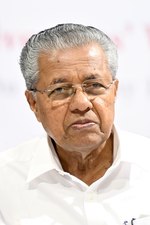 | |
| Legislative branch | |
|---|---|
| Assembly |
|
| Speaker | A. N. Shamseer |
| Members in Assembly | 140 |
| Council | Kerala Legislative Assembly |
| Executive branch | |
| Governor | Rajendra Viswanath Arlekar |
| Chief Minister | Pinarayi Vijayan |
| Chief Secretary | Saarada Muraleedharan |
| Judiciary | |
| High Court | Kerala High Court |
| Chief Justice | Nidhin M Jamdar |
| District Courts | 14 |
Kerala Council of Ministers, are elected legislative members, who are appointed as ministers by the Kerala State Governor to form the executive branch of the Government of Kerala. They hold various portfolios as decided by the Chief Minister of Kerala.
Contents
- Present Council of Ministers
- Chronological Order of Kerala Government Ministries
- See also
- References
- Further reading
- External links
The Kerala Council of Ministers is headed by the Chief Minister and oversees the work of all ministers. The structure of the Kerala State Government is determined by the Constitution of India (1950). [1]
The Keralam Council of Ministers along with the other elected legislative members assemble at the Kerala Legislative Assembly to introduce new drafts of law (otherwise known as bills), discuss them with other elected members of the assembly, revise the drafts for edits if necessary. A bill once finalised is sent to vote on the floor of the house of Kerala Legislative Assembly and if the bill receives the majority vote, it becomes a binding law else it is rejected and the existing law continues. The members of the Legislative Assembly together also makes the Council of Ministers and the Chief Minister accountable on behalf of the people, for any misuse of executive powers vested with them.
The Kerala Council of Ministers is accountable to periodically evaluate the existing law of the land and ensures they are in the best interest of the society at large, which they represent under a democratic system. [2] Kerala State Governor is also regarded as a member of the Legislative Assembly and may suspend or dissolve when no coalition is able to muster a working majority). [2]



















